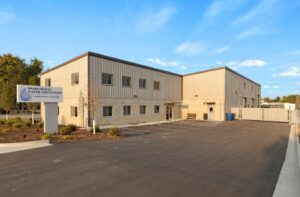Utilities are Essential: IRWA’s Response to COVID-19

This post is one of a series highlighting the ways in which water users have adapted to life in the time of COVID-19.
Shelley Roberts is the CEO of the Idaho Rural Water Association (“IRWA”). IRWA is a resource for small water systems in the State of Idaho that offers training for drinking water and wastewater operators and aids those systems in times of need. Their objective is “to ensure Idaho’s rural communities are safe while still maintaining the high quality of life we hold so dear.”
For Shelley, the best part of working with IRWA has been the same since day one. As someone with a business background, she loves being able to utilize her education by running a non-profit corporation benefiting others. “I’ve never met such salt of the earth people as I have in the water industry,” she says. “They are all so genuine, caring, and kind.”
COVID-19’s impact on IRWA started during its Spring Conference in March, 2020, which concluded on Friday, March 13- the same day the Federal Government declared a state of emergency. The following Monday, all of IRWA’s administrative staff were directed to stay home. The week after, IRWA organized a work from home policy that allowed employees to perform their duties remotely. For IRWA’s circuit riders, though, it was a different story.

Drinking water and wastewater are essential services, and adjustments had to be made to ensure they continued to run smoothly. IRWA employs numerous circuit riders and field staff whose jobs require in-person and onsite contact with water system operators. However, thanks to video conferencing technology, much of their communications with the operators could be conducted remotely, limiting potential exposure. When site visits were required, field staff practiced social distancing as much as possible, including staying 6 feet apart and wearing face masks.
An unexpected benefit of remote work was an increased ability not only to contact the systems but for internal communication between IRWA’s employees, office and field staff alike. “We learned how to use Teams and started having weekly video conferences,” Shelly told us. “We weren’t able to do that before. It was nice for everyone [at IRWA] to have more contact with each other.”
According to Shelley, one of the biggest impacts COVID-19 had was fear of “what ifs.” The ability to communicate with water systems in remote locations without having to travel allowed the circuit riders to discuss those concerns quickly and determine what steps were needed to resolve any issues.
Another of IRWA’s major concerns was operator availability. Many of the small systems IRWA works with are operated by volunteers who have other commitments to day jobs and families. Should those operators fall ill or otherwise become unable to perform their duties, it can be difficult to find other operators to fill in.
IRWA has long worked with the Environmental Protection Agency (“EPA”) to locally administer the water/wastewater agency response network, otherwise known as WARN. In response, through WARN, IRWA was able to put together a list of volunteers who could assist if a system’s regular operator was not available.

Shelley says that IRWA’s response to COVID-19 did not greatly differ from their response to other emergencies in which the first step is typically outreach and communication with the systems IRWA works with. For example, on March 21, 2020, a magnitude 6.5 earthquake struck central Idaho. Circuit riders needed immediate contact with water systems to assess any potential damage caused by the quake. Luckily, the remote communication procedures implemented in response to COVID-19 allowed IRWA’s circuit riders to easily check in with system operators.
While the pandemic continues to impact daily life and operations for IRWA in general and Shelley personally, she looks forward to life after COVID-19. Professionally, she awaits opening up the new training center in Boise, Idaho IRWA constructed just prior to the shutdown. The center will host hands-on trainings for water and wastewater operators in addition to traditional classroom training. As for her personally? Being able to hug her friends and extended family.
Shelley participated in a panel discussion on the pandemic’s impact on the Idaho water sector as a part of the Idaho Association of Cities’ 2020 virtual conference, which you can watch in full here. For more information about IRWA, including details for upcoming trainings, check out their website here. And stay tuned to Schroeder Law Offices’ blog for more posts in this series and other water-related issues!